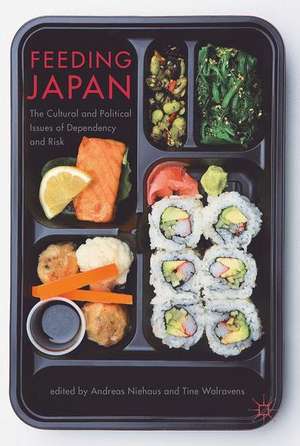Feeding Japan: The Cultural and Political Issues of Dependency and Risk
Editat de Andreas Niehaus, Tine Walravensen Limba Engleză Hardback – 7 sep 2017
| Toate formatele și edițiile | Preț | Express |
|---|---|---|
| Paperback (1) | 702.88 lei 38-44 zile | |
| Springer International Publishing – 3 aug 2018 | 702.88 lei 38-44 zile | |
| Hardback (1) | 1098.71 lei 6-8 săpt. | |
| Springer International Publishing – 7 sep 2017 | 1098.71 lei 6-8 săpt. |
Preț: 1098.71 lei
Preț vechi: 1339.88 lei
-18% Nou
Puncte Express: 1648
Preț estimativ în valută:
210.27€ • 218.42$ • 174.66£
210.27€ • 218.42$ • 174.66£
Carte tipărită la comandă
Livrare economică 03-17 februarie 25
Preluare comenzi: 021 569.72.76
Specificații
ISBN-13: 9783319505527
ISBN-10: 3319505521
Pagini: 404
Ilustrații: XI, 540 p. 10 illus.
Dimensiuni: 148 x 210 x 32 mm
Greutate: 0.81 kg
Ediția:1st ed. 2017
Editura: Springer International Publishing
Colecția Palgrave Macmillan
Locul publicării:Cham, Switzerland
ISBN-10: 3319505521
Pagini: 404
Ilustrații: XI, 540 p. 10 illus.
Dimensiuni: 148 x 210 x 32 mm
Greutate: 0.81 kg
Ediția:1st ed. 2017
Editura: Springer International Publishing
Colecția Palgrave Macmillan
Locul publicării:Cham, Switzerland
Cuprins
Introduction: Reconsidering Japanese food; Andreas Niehaus and Tine Walravens.- Part I: Inventing Japanese Food Identities.- 2.“They should be called gluttons and be despised”: Food, Body and Ideology in Kaibara Ekiken’s Yōjōkun (1713); Andreas Niehaus.- 3. ‘Sweets Reimagined’: The Construction of Confectionary Identities, 1890-1930; Mitsuda TatsuyaFor Gluttons, Not Housewives: Japan’s First Gourmet Magazine, Kuidōraku; Eric Rath.- 4. Global Recognition and Domestic Containment: Culinary Soft Power in Japan; Stephanie Assmann.- Part II: Feeding the Nation: Japanese Food Identities in Times of Globalization.- 5. Deconstructing “Kokushu”: The Promotion of Sake as Japan’s National Alcohol Drink in Times of Crisis in the Sake Industry; Dick Stegewerns.- 6. The Drink of the Nation? Coffee in Japan's Culinary Culture; Helena Grinshpun.- 7. Forging Ahead with Bread: Nationalism, Networks and Narratives of Progress and Modernity in Japan Sheng Annie.- 8. Joining the Global Win
e World: Japan’s Winemaking Industry; Wang Chuanfei.- Part III: Japanese Food Industries Inside-Out.- 9. Chinese Food Threatening the Japanese Table: Changing Perceptions of Imported Chinese Food in Japan; Tine Walravens.- 10. Domesticating the Japanese Culinary Field in Shanghai; James Farrer.- 11. Ḥalāl Foods Discourse and Constructing Muslim Identities in Japan; Ono Junichi.- 12. Eating Japanese – Being Japanese: Ethnic Food in Hawai’I; Jutta Teuwsen.- Part IV: Agricultural Politics of Self-Suffiency and Dependency.- 13. Japan in the International Food Regimes: Understanding Japanese Food Self-sufficiency Decline; Felice Farina.- 14. The Trans-Pacific Partnership, Import-Dependency, and the Future of Food Security in Japan; Paul O’Shea.- 15. Subsidized Tradition, Networks, and Power: Hamlet Farming in Japan’s Changing Agricultural Support and Protection Regime; Hanno Jentzsch.- Part V: Post-Fukushima Food Education and Food Safety.- 16. Eating School Lunches Together after the Fukushima Accident; Kimura Aya H.- 17. National Solidarity of Food Insecurity: Food Practice and Nationalism in Post- 3/11 Japan; Takeda Hiroko.- 18. Discourse on Food Safety and the Trans-Pacific Partnership (TPP): Perspectives from Japan; Cornelia Reiher.
e World: Japan’s Winemaking Industry; Wang Chuanfei.- Part III: Japanese Food Industries Inside-Out.- 9. Chinese Food Threatening the Japanese Table: Changing Perceptions of Imported Chinese Food in Japan; Tine Walravens.- 10. Domesticating the Japanese Culinary Field in Shanghai; James Farrer.- 11. Ḥalāl Foods Discourse and Constructing Muslim Identities in Japan; Ono Junichi.- 12. Eating Japanese – Being Japanese: Ethnic Food in Hawai’I; Jutta Teuwsen.- Part IV: Agricultural Politics of Self-Suffiency and Dependency.- 13. Japan in the International Food Regimes: Understanding Japanese Food Self-sufficiency Decline; Felice Farina.- 14. The Trans-Pacific Partnership, Import-Dependency, and the Future of Food Security in Japan; Paul O’Shea.- 15. Subsidized Tradition, Networks, and Power: Hamlet Farming in Japan’s Changing Agricultural Support and Protection Regime; Hanno Jentzsch.- Part V: Post-Fukushima Food Education and Food Safety.- 16. Eating School Lunches Together after the Fukushima Accident; Kimura Aya H.- 17. National Solidarity of Food Insecurity: Food Practice and Nationalism in Post- 3/11 Japan; Takeda Hiroko.- 18. Discourse on Food Safety and the Trans-Pacific Partnership (TPP): Perspectives from Japan; Cornelia Reiher.
Recenzii
“This is the best volume dealing with the production and consumption of food in Japan that has been published to date.” (Katarzyna J. Cwiertka, Global Food History, Vol. 4 (1), 2018)
Notă biografică
Andreas Niehaus is Head of the Department Languages and Cultures at Ghent University, Belgium. His research focuses on early-modern and modern Japanese body culture, sport history as well as cultural and national identities.
Tine Walravens is a Research Assistant at the Institute of Japanese Studies, Ghent University, Belgium. Her research is on the politics of food and food safety in East Asia, in particular Japanese consumer trust and food risk.
Tine Walravens is a Research Assistant at the Institute of Japanese Studies, Ghent University, Belgium. Her research is on the politics of food and food safety in East Asia, in particular Japanese consumer trust and food risk.
Textul de pe ultima copertă
This edited collection explores the historical dimensions, cultural practices, socio-economic mechanisms and political agendas that shape the notion of a national cuisine inside and outside of Japan. Japanese food is often perceived as pure, natural, healthy and timeless, and these words not only fuel a hype surrounding Japanese food and lifestyle worldwide, but also a domestic retro-movement that finds health and authenticity in ‘traditional’ ingredients, dishes and foodways. The authors in this volume bring together research from the fields of history, cultural and religious studies, food studies as well as political science and international relations, and aim to shed light on relevant aspects of culinary nationalism in Japan while unearthing the underlying patterns and processes in the construction of food identities.
Caracteristici
Analyses issues from a multidisciplinary perspective Discusses the distinctive methods of food education Covers the pre-modern and modern period of Japanese history














